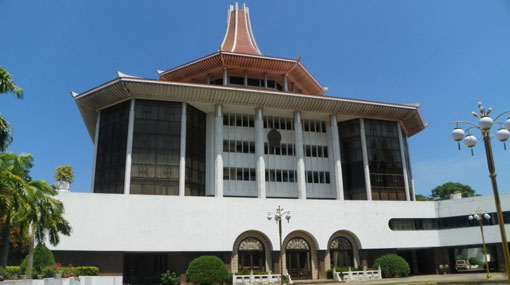Judicature (Amendment) Bill needs two-thirds majority: SC
April 3, 2018 02:27 pm
The Supreme Court has informed the Speaker of Parliament that the Judicature (Amendment) Bill needs to be passed with a two-thirds majority as certain clauses included in the bill require amendments to the Constitution.
The determination of the Supreme Court on the Bill titled “Judicature (Amendment)” in respect of which petitions have been filed in the Supreme Court in terms of Article 121 (1) of the Constitution, was announced in Parliament today (3).
The Supreme Court has determined that section 12A(1) of the Bill is inconsistent with the article 154P (3) (a) of the Constitution and an amendment is required to be made to the Constitution to give effect to the section 12A(1) of the Bill. “This requires the Bill to be passed by a two-third majority.”
However, if the jurisdiction is conferred on the High Court of Provinces under article 154(P)(3)(C) like in Act No. 10 of 1996 and Act No. 54 of 2006 this amending section will cease to be inconsistent, it said.
The amending section 12A(2) of the Bill requires the Judicial Service Commission to nominate judges to the Permanent High Court at Bar.
“This is inconsistent with the article 154(P)2 of the Constitution and an amendment is required to be made to the Constitution to give effect to the section 12A(2) of the Bill which requires a two-third majority.”
However, if 12A(2) of the Bill is removed and Article 154P(2) remains as it is this inconsistency will cease, according to the Supreme Court determination.
“The amending section 12(A)(7) is inconsistent with Article 12(1) of the Constitution. However, if the Chief Justice is given the power to decide whether to hold a trial at Bar or not this amending section will cease to be inconsistent.”
The Speaker has ordered that the determination of the Supreme Court be printed in the Official Report of today’s proceedings.
The court concluded examining the petitions filed on the Judicature (Amendment) Bill on March 22 and informed its determination to the Speaker.
The Judicature (Amendment) Act, No. 26 of 2017 is an act to amend the Judicature Act, No. 2 of 1978. It was brought in by the government to set up a permanent High Court-at-bar to expedite the large amount of pending cases.
Several petitions were filed challenging the bill by several parties including Joint Opposition MP Dinesh Gunawardena and Sri Lanka Podujana Peramuna (SLPP) chairman Prof. G.L. Peiris.
Those petitions allege that certain sections of the proposed draft bill would allow the government to seize the powers of the judiciary and that certain selected individuals could likely be targeted for acts of revenge through the Special High Court to be established by the bill.
They also state that should the bill be passed, it would vest unusual power with the Attorney General and the Director General of the Bribery Commission. Therefore the petitions requested the Supreme Court to rule that bill requires approval of two-thirds majority in Parliament and a referendum.
Meanwhile an intervention petition supporting the bill were filed by 11 including Patali Champika Ranawaka, Harsha de Silva, Eran Wickramaratne, Ajith P. Perera, Karunaratne Paranawithana and civil society activists.
The petitions were taken up before a three-member judge bench comprising Chief Justice Priyasad Dep, Buwaneka Aluwihare and Nalin Perera.












